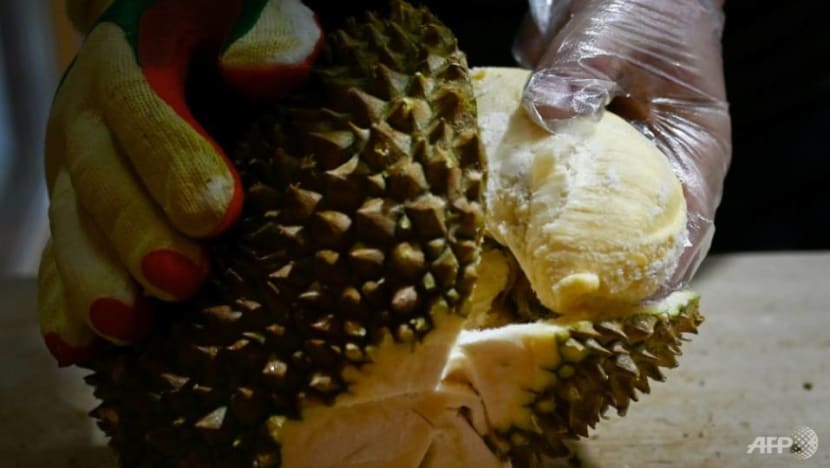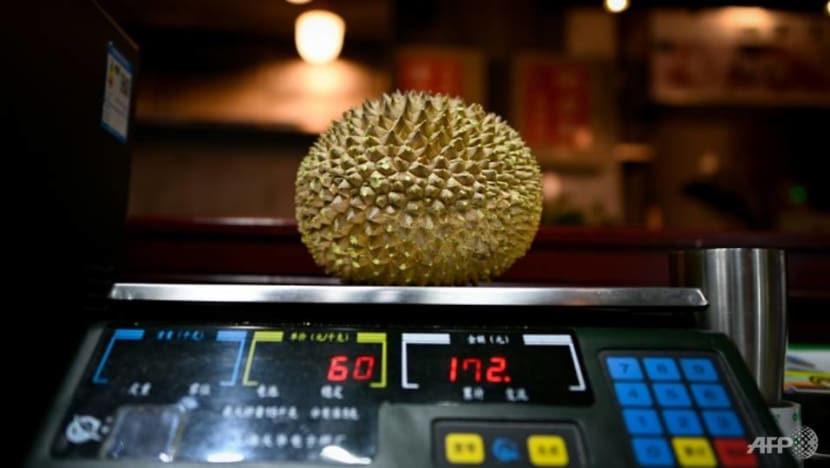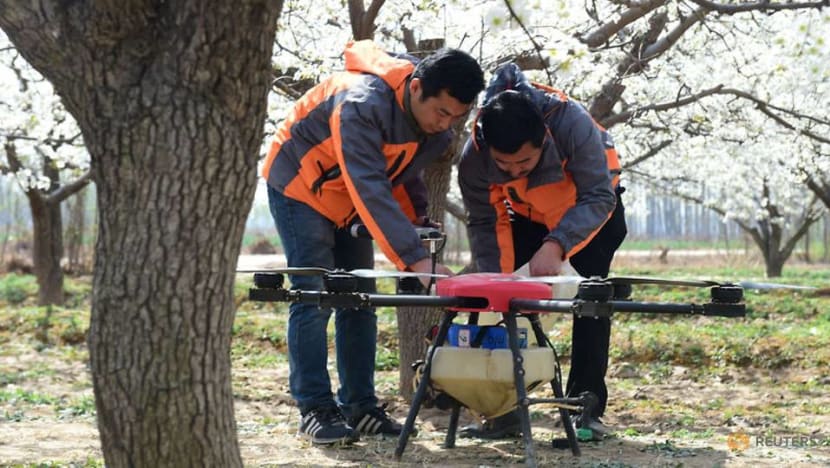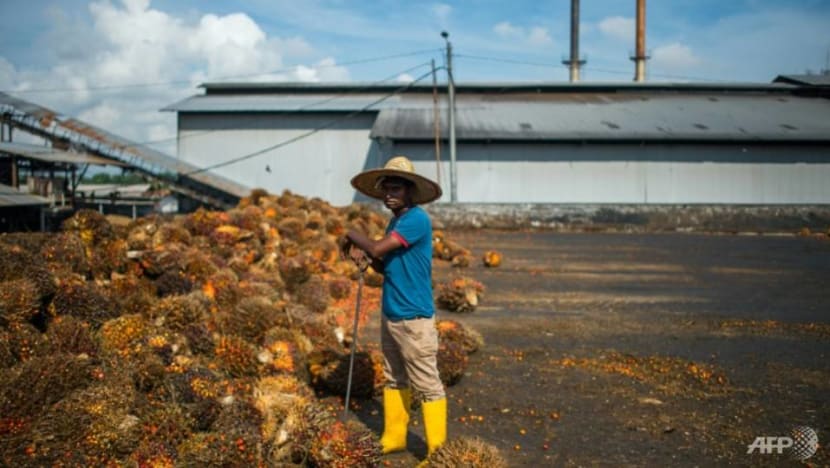commentary Commentary
Commentary: Durians, blockchain and politics - inside the choppy world of Chinese investors in Malaysia
The Chinese business community in Malaysia has weathered the storm of politically charged public sentiment since the Pakatan Harapan swept into government, says China commentator Tom McGregor.

Soaring demand for durians in China is being blamed for a new wave of deforestation in Malaysia with environmentalists warning vast amounts of jungle is being cleared to make way for massive plantations of the spiky, pungent fruit (Photo: AFP/WANG ZHAO)
BEIJING: Malaysian Prime Minister Dr Mahathir Mohamad swept into power in elections last year, where he pledged to take a tougher stand against Beijing and Chinese business investments in Malaysia, after painting the former leader Najib Razak as a man who sold out his country and countrymen to foreign interests.
But for many Chinese companies closely watching developments, business is business, and that should not conflict with how politics play out in other countries.
Still, Dr Mahathir had pressed the China button so hard with his relentless diatribes against Chinese investments during the campaign trail, employing scare tactics and whipping up anti-foreign sentiment that after his landslide victory, many Malaysian voters anticipated he would make good on his promises and place more restrictions on foreign investors, including those from China.
And for a while, it looked like he was doing just that. He swiftly cancelled many Beijing-backed infrastructure project. The status of the East Coast Rail Link project remains uncertain. Other smaller-scale billion-dollar pipeline projects to be built by the China Petroleum Pipeline Bureau were also terminated last year.

READ: The impasse over the East Coast Rail Link is hurting Malaysia’s credibility, a commentary
But then reality struck and the new Pakatan Harapan coalition soon came around to the idea that Chinese investments do bring positive benefits to Malaysians and catalyse other foreign investments into the Malaysian economy.
With some masterful politicking, the narrative about such foreign investments began to shift, to become more qualified and less zero-sum.
In September 2018, Mahathir said the Malaysian government was willing to open up Malaysia to foreign direct investments from China, to set up factories that would employ Malaysian workers, but not to come in as labourers or own huge developments that would drive up the property prices and costs of living.
Memories of his initial stance on China started to fade from the Malaysian psyche.
SWEET TOOTH FOR DURIANS
Fast forward to February 2019. The Chinese bogeyman has been released again, as China’s demand for durian has been blamed for deforestation in Malaysia.
News reports highlight how durian growers are shifting from smallholder orchards to industrial-scale plantations. Environmentalists have warned of the threat to rainforests already under siege by loggers and palm oil plantations.
Rumours that Chinese businesses are buying up stakes in these operations have swirled, as news of how one Musang King durian can go for 800 yuan (US$120) went viral.
Beneath the public spectacle and negative news reporting, however, the reality is a more positive, cooperative one. The Malaysian government itself has backed the expansion of the industry, hoping to cash in on a growing export market for durians, and these efforts have met with some success.

The value of durian shipments from Malaysia to China in 2018 doubled compared to the year before. Plans are in the pipeline to double production by 2030, though the Malaysian government insists growth of such plantations will remain sustainable and deforestation will be discouraged.
Even smallholders under the Federal Land Development Authority (FELDA) are starting to plant durians given the additional high source of income it brings to farmers.
INTERNET PLUS FARMING
While general concerns about predatory business practices remain, the reality is that the average Chinese investor who wants to get involved in Malaysia’s durian market isn’t the shady big business owner who will snuff out local farms.
A look within China’s agricultural sector can be instructive.
The Chinese government is encouraging a “Internet Plus Agriculture” model to promote integrated rural development and bring farmers more business opportunities to increase their income and energise rural revitalisation. Since last year, President Xi Jinping has stressed agriculture’s need to embrace mechanisation and automation, as well as the employment of e-commerce to tap unmet demand.
Authorities are also looking at helping farmers adopt digital technologies to aid with farmland management, pest control and production. Tracking sensors, big data and drones are increasingly employed to enhance efficiency.
There are also efforts to develop cold chain logistics and e-commerce platforms, as well as supporting facilities that process, pack, store and preserve farm produce.
The hope is that this boost in agriculture will provide a new engine of growth for China. These efforts are seeing early first fruits, as online sales of agricultural products have reached 300 billion yuan and seen the creation of 29 million job in 2018.

READ: Surprising findings in learning from China’s incredible growth, a commentary
Online platforms are also connecting Chinese smallholders to investors.
Hainan-based Internet service provider icloudinn network has developed an app where investors can “adopt’” a piece of garden, livestock or tree and in exchange, receive produce, meat or fruits for a period of time and a livestream of how their plot of land, livestock or tree are doing.
Nearly thousands of coconut trees in Haosheng, Hainan have been adopted by overseas China and tourists, and such new business paradigms have opened up new ways for villages to gain access to funding.
No doubt such a similar format can be applied to Malaysian durian plantations seeking investments from China. A real-time live-streamed video to monitor durian trees can be opened up on an app like WeChat. Chinese investors can pay the plantation owner, via WeChat digital transfers, for the pruning, labour and other costs of operations from the plantation period to the harvesting season.
READ: Can China's superstar tech giants win over reluctant US customers? A commentary
In fact, such apps are so advanced and attractive, investors can even pay through monthly installments and limit investments to a specific number of trees during the growing season. The real-time videos will show how well the durians are growing and the care they get.
By utilising blockchain technologies, the Malaysian farmer can make arrangements for Chinese investors to take delivery of the durians, from tree to family table. Technology can be an enabler for Malaysia’s agricultural sector.
GRABBING BIGGER SHARE OF PALM OIL
Back to Malaysia. The country is embracing foreign investments in agriculture, after huge stockpiles of palm oil were stuck following tighter restrictions on foreign investments and export.
Chinese buyers have just this week upped their purchase of Malaysian palm oil to 4.7 million tonnes, 50 per cent more than what it currently consumes from Malaysia.
A total investment of RM3.63 billion (US$891 million) in four purchase intent documents has been inked at a ceremony presided over by Primary Industries Minister Teresa Kok and Chinese ambassador to Malaysia Bai Tai at the Malaysia-China Palm Oil Business Forum.

READ: Playing palm oil politics ahead of Malaysia’s general elections, a commentary
With those deals sealed, China is now Malaysia’s third largest purchaser of palm oil. It is no surprise as palm oil can be converted into more environmentally friendly biofuel.
That green move is in line with the Chinese central government’s call to enhance environmental protection measures nationwide, which is expected to be given additional emphasis at the country’s annual gathering of the National People’s Congress and this week’s Chinese People’s Consultative Congress.
Chinese companies have made huge investments in the development and integration of renewable energy for the national economy. By producing more biodiesel that can reduce China’s carbon footprint, the country is in better shape to tackle pollution and smog head on.
IGNORE THE HATE AND STAY IN BUSINESS
Almost a year since the Pakatan Harapan claimed the seat of government, the Chinese business community in Malaysia has weathered a storm of politically charged public sentiment.
That’s a smart move, because Malaysia offers great opportunities in a growing region. More Chinese factories are closing down in the mainland, yet re-opening up in Southeast Asia and South Asia.
Make no mistake about it. Chinese business do not particularly enjoy being poured scorn on or seeing fresh restrictions placed on their investment options, but pragmatism usually takes over as long-term profits dot the landscape for those who buckle up and stay the course.
Tom McGregor is a commentator on Asia-Pacific affairs based in Beijing.















